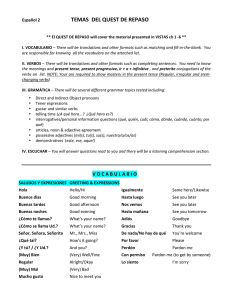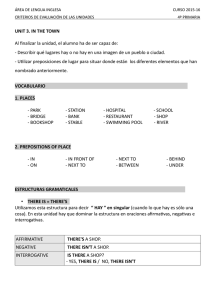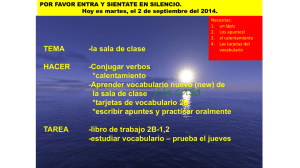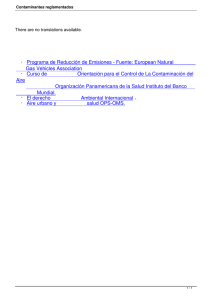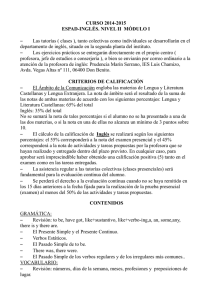ingles-IV-refuerzo-gramatical-en-espanol
Anuncio
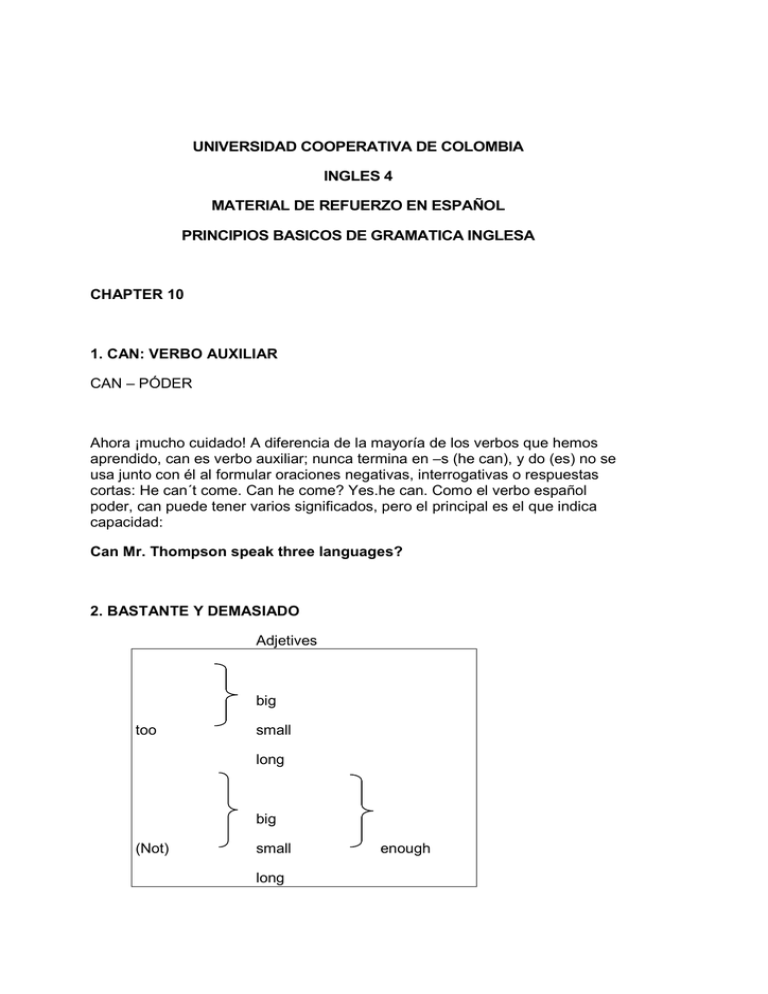
UNIVERSIDAD COOPERATIVA DE COLOMBIA INGLES 4 MATERIAL DE REFUERZO EN ESPAÑOL PRINCIPIOS BASICOS DE GRAMATICA INGLESA CHAPTER 10 1. CAN: VERBO AUXILIAR CAN – PÓDER Ahora ¡mucho cuidado! A diferencia de la mayoría de los verbos que hemos aprendido, can es verbo auxiliar; nunca termina en –s (he can), y do (es) no se usa junto con él al formular oraciones negativas, interrogativas o respuestas cortas: He can´t come. Can he come? Yes.he can. Como el verbo español poder, can puede tener varios significados, pero el principal es el que indica capacidad: Can Mr. Thompson speak three languages? 2. BASTANTE Y DEMASIADO Adjetives big too small long big (Not) small long enough Nouns money too much time (not) enough room work books too many forks (not) enough cars people Adjectives – adjetivos Recordará que la palabra too significa también cuando aparece al final de una oración. Too se usa también con los adjetivos para el grado o la extensión de algo: too big (demasiado grande). Nouns – sustantivos Aquí vemos de nuevo la diferencia entre los sustantivos que se pueden contar y los sustantivos que no se pueden contar; too much money, en cambio too many books. Fíjese bien en el orden de las palabras: not enough room, en cambio not big enough. A little to long Un poco (demasiado) largo/a En ingles too (demasiado, excesivamente se usa mucho mas frecuente que en español. Es común, además encontrar too junto con little: A little too long Un poco (demasiado) largo/a CHAPTER 11,12 1. WHAT IS THERE IN THE OFFICE? Is there anyone in this office? -No, there isn´t. There isn´t anyone in this office. There´s no one in this office. Is there anything on the chair? -No, there isn´t. There isn´t anything on the chair. There´s nothing on the chair. Is there any water in the glass? -No, there isn´t. There isn´t any water in the glass. There´s no water in the glass. Are there any papers on the desk? No, there aren´t. There aren´t any papers on the desk. There are not papers on the desk No one – nadie Nothing – nada No water – agua ninguna No papers – ningun papel Las formas not any / no, como se presentan en estos ejemplos son equivalentes, al igual que las formas not anyone / no one y not anything / nothing. Unas y otras se usan extensivamente. Observe que en ingles, a diferencia del español, no se usa el doble negativo. “There´s nothing on the chair”. (Literalmente “hay nada en la silla”). O “there isn´t anything on the chair”. (Literalmente “no hay algo en la silla”). En ambos casos la traducción correcta sería: no hay nada en la silla. Tenga mucho cuidado con esta construcción. There is n´t anyone. there´s no one. anyone not anything any (water, papers, etc) 2. ALGO /ALGUIEN no one nothing no (water, papers, etc) Is there anything…? Is there anyone…? ¿(hay algo…? ¡hay alguien? There´s something There´s someone… Hay algo… Hay alguien… There isn´t anyone… No hay nadie En el capitulo 4 vimos que any con mayor frecuencia al preguntar y al negar y some al afirmar; esto mismo se aplica a anything/ anyone y something / someone. Is there anything…? Is there anyone…? - No, there isn´t anything - No, there isn´t anyone - Yes, there´s something. - Yes, there´s someone 3. Condiciones reales Ej. If Janet goes to new York next month, she´ll see theStatue of liberty. Si Janet va el proximo mes a Nueva York, verá la estatua de la libertad. If we have time tomorrow, we´ll finish the report. Si tenemos tiempo mañana, terminaremos el reporte. 4. El futuro will + Infinitivo Will you be in tomorrow? En el capitulo 11 aprenderemos una forma de referirse al futuro mediante la combinación del going to y otro verbo en infinitivo (futuro – inmediato). Ahora aprenderemos otra forma distinta: el futuro. Este tiempo verbal se usa en ingles para referirse tambien a condiciones y acciones que tendran efecto en el futuro: I´ll be busy. Su uso es muy frecuente en expresiones coluquiales breves que indican una preferencia o una intencion circunstancial: I´ll take carrots. Es muy facil formar el futuro: solo coloque el auxiliar Hill antes del infinitivo (she Hill be). Atención: Hill no cambia, nunca se le añade una –s. En el inglés coloquio se usan las contracciones I´ll, You´ll,etc para I Hill, you Hill, etc. WILL YOU BE I TOMORROW? Usually Mr. Thompson is at the office. Next week he will be at the office. I go you come we work they he goes she comes it works Will Jane be at the office tomorrow? go will come won´t work etc. Para formar respuestas cortas y preguntas, incluyendo las reiterativas, will funciona De igual modo que los verbos auxiliares como can. Observe que los auxiliares do, does, did no se usan nunca con will, tratese o no de preguntas o de respuestas cortas. Usually Janet Next week Janet … is at the office during they day. … will be at the office during the day. … works from nine to five. … will work from nine to five … goes to work by bus … will go to work by bus … isn´t at home before six. … won´t be home before six. …doesn´t work on Saturday … won´t work on Saturday …doesn´t go to qork by train. … won´t go to work by train. CHAPTER12 Preguntas reiterativas YOU'RE MR. THOMPSON, ARENTYOU? A este tipo de preguntas se les da el nombre de "reiterativas" y se usan por lo generalcuando el hablante está casi seguro de la respuesta o busca confirmación de estar en lo cierto. Por ejemplo, en esta oración, yo (el hablante) estoy casi convencido de que usted es el Sr. Thompson. Se trata del mismo supuesto que en la oración española; Usted es el Sr. Thompson, ¿no es así? Como indica el ejemplo, la declaración es afirmativa y la pregunta reiterativa es negativa. Preste particular atención al hecho de que se debe mantener la concordancia entre los tiempos verbales de la declaración y la pregunta reiterativa, así como al hecho de que el verbo de la pregunta debe referirse a la misma persona que el de la declaración. Observe además que los verbos be (am, ¡s, are) y can aparecen tanto en la declaración como en la pregunta reiterativa, mientras que casi todos los otros verbos son sustituidos por do (don't doesn't) en la pregunta. En los ejemplos que se ofrecen en esta página, observe como forman las preguntas reiterativas los distintos verbos y tiempos verbales. YOU'RE MR. THOMPSON, AREN´T YOU? " Mr. Thompson is at Macy's, isn't he? Miss Duval ¡s from París, isn't she? We're taking the train, aren't we? It was a good movie, wasn't it? We were right, weren't we? Mr. Thompson can see me tomorrow, can't he? Mr. Thompson speaks English, doesn't he? You take sugar, don't you? Mr. Thompson speaks French, doesn't he? You live on Main Street, don't you? They nave a big apartment, dont't they? It takes about an hour, doesn't it? Mr. Thompson bought a jacket, didn't he? You went to the movies, didn't you? Bill had a red car, didn't he? She worked very hard, didn't she? We walked for an hour, didn't we? They sat over there, didn't they? You're not forgetting your meeting at eleven, are you? No se le ha olvidado su reunión de las once, ¿verdad? En el capítulo 10 aprendimos a formar "preguntas reiterativas" en las cuales la declaración principal es afirmativa y la pregunta es negativa. En este caso la declaración principal es negativa y la pregunta reiterativ es por lo tanto afirmativa: Janet cree que al Sr. Thompson no se le ha olvidado la reunión. You'II be in in trie afternoon, won't you? Estará en la oficina esta tarde, ¿no es así? Hemos visto anteriormente abundantes ejemplos de "preguntas reiterativas" en otros tiempos verbales. Won you? Es solo una pregunta reiterativa en futuro.
